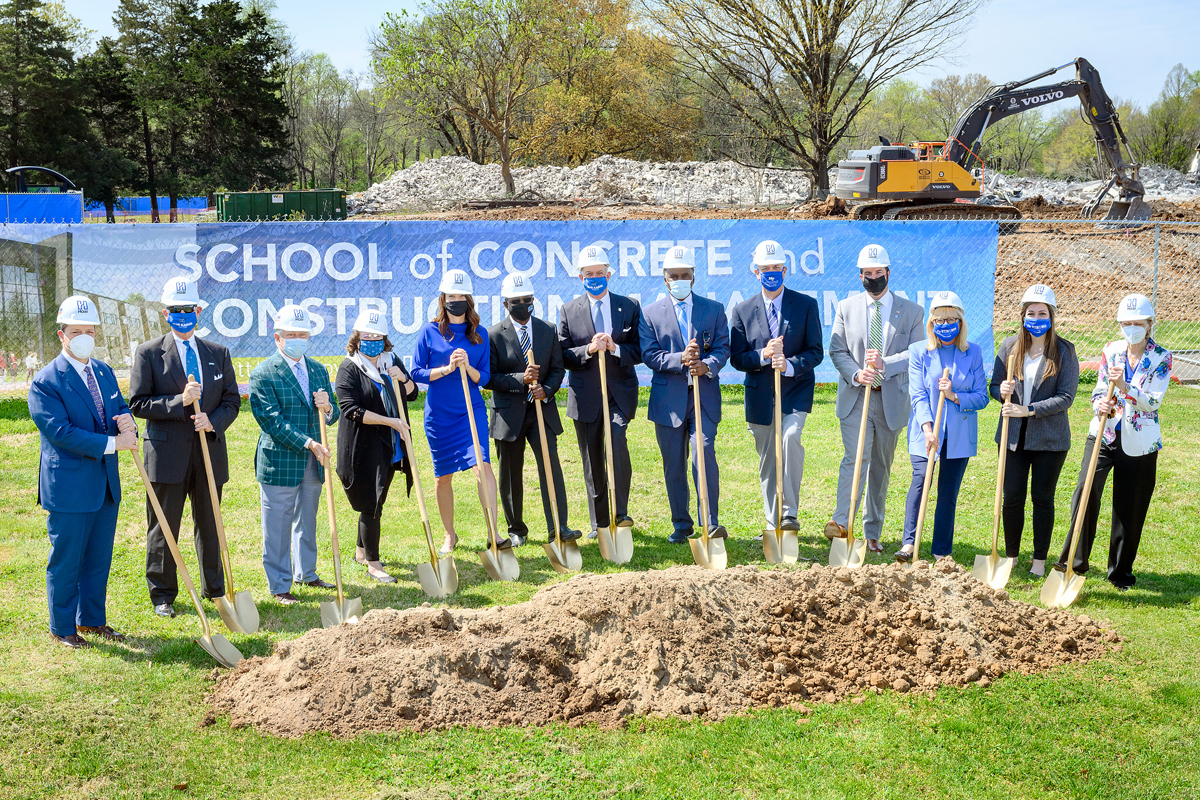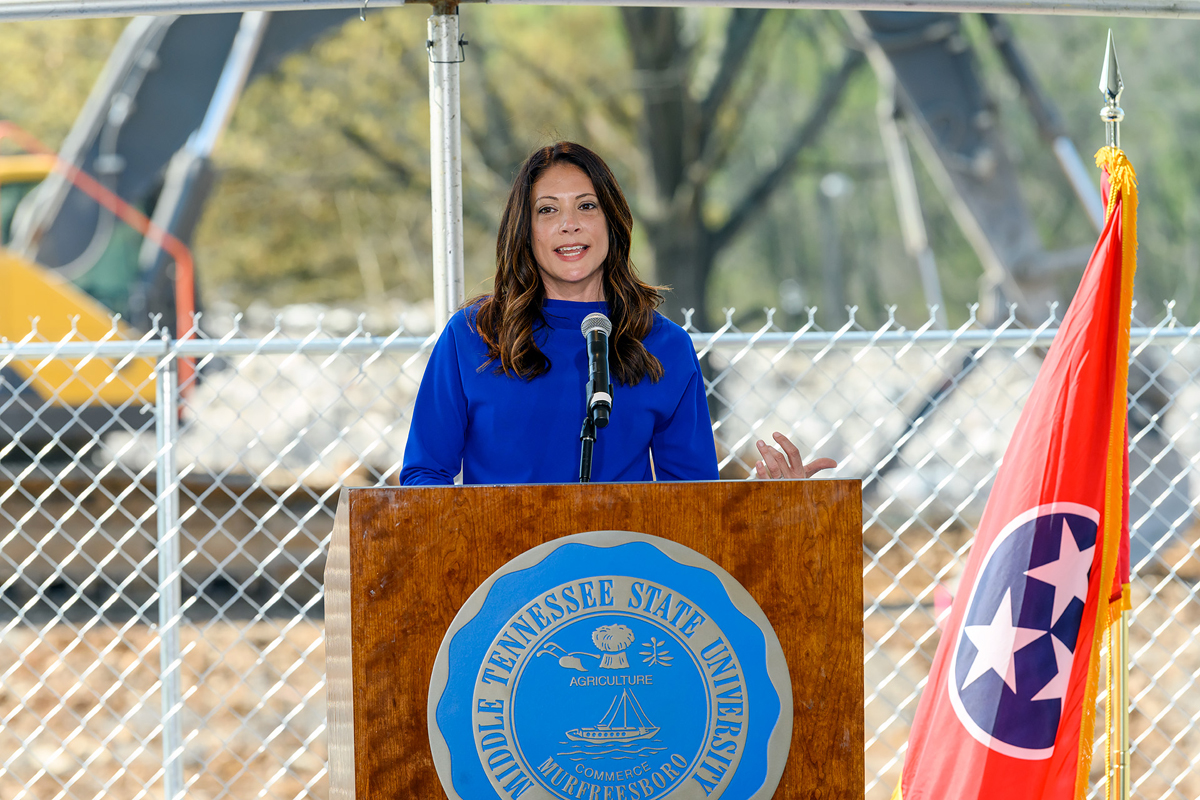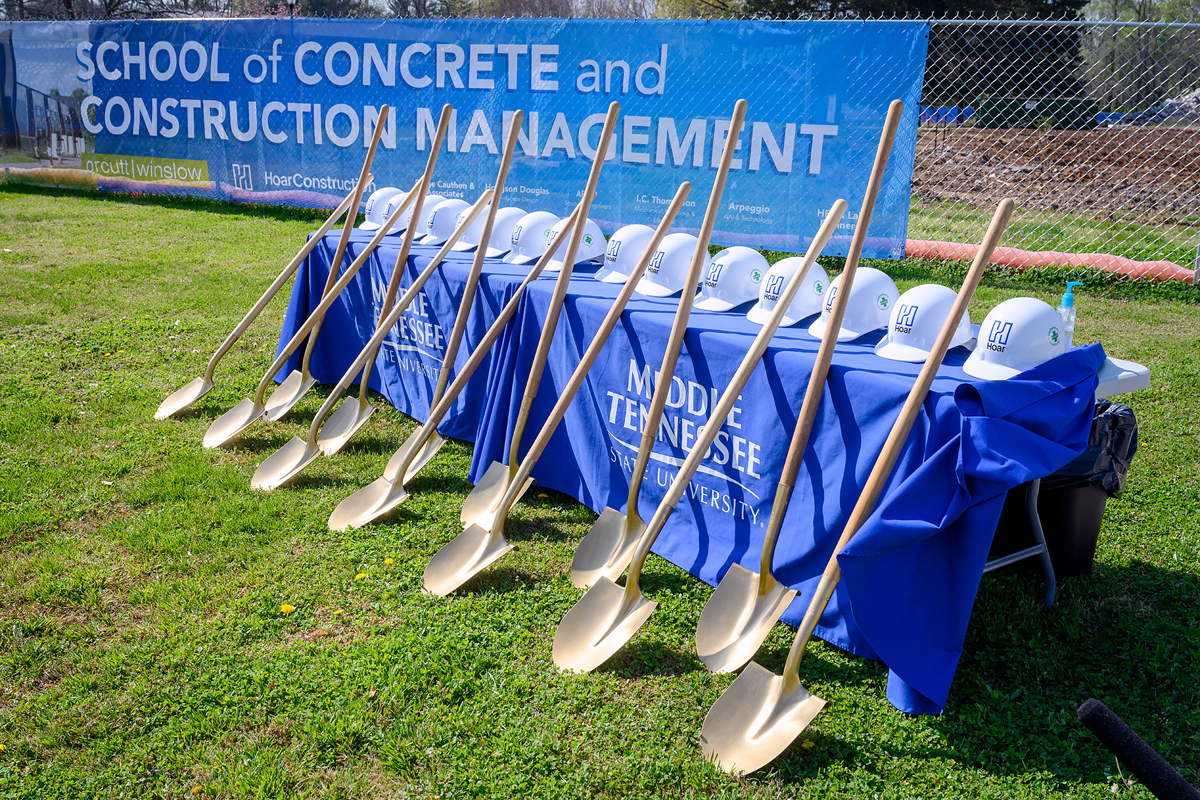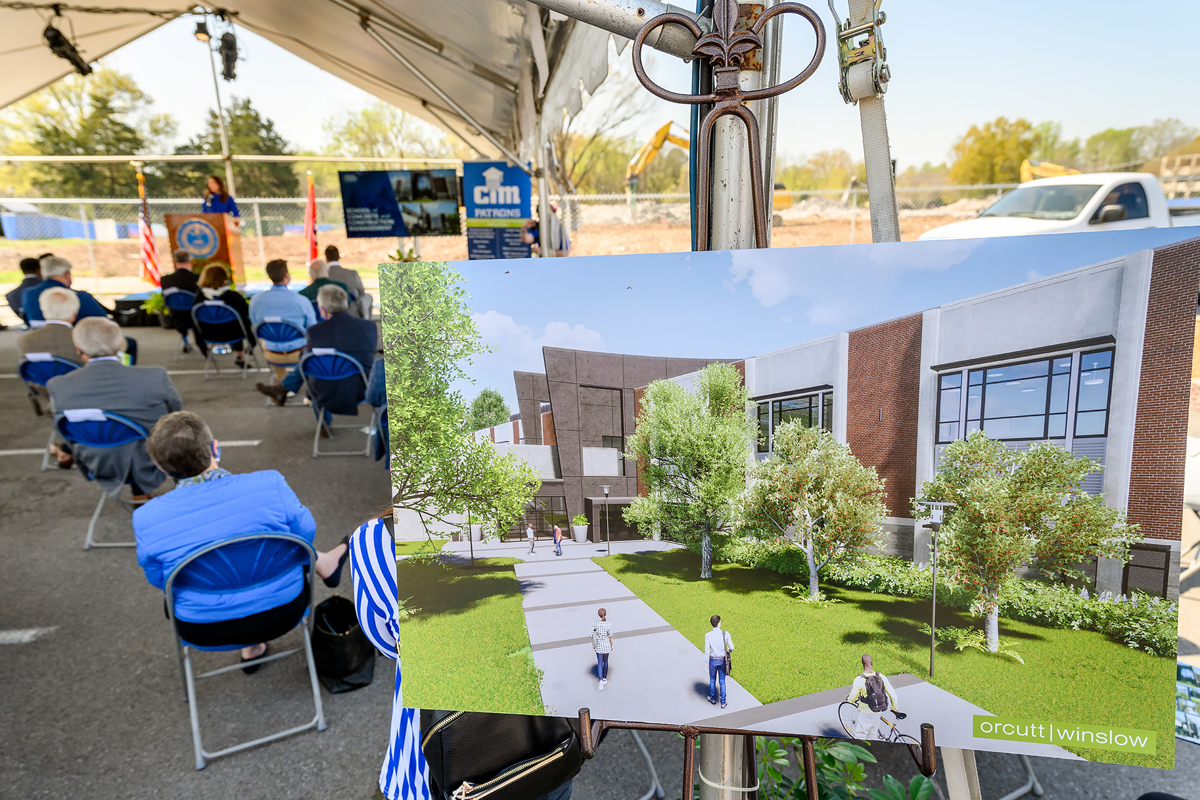Middle Tennessee State University officials broke ground Tuesday, April 6, on a much-needed 54,000-square-foot, $40.1 million School of Concrete and Construction Management building.
With special guests, industry partners and alumni on hand in person and many others watching virtually on True Blue TV, the long-awaited ceremony was held outdoors near the corner of Blue Raider and Alumni drives in the southeast part of campus.

MTSU officials celebrated the groundbreaking ceremony for the 54,000-square-foot, $40.1 million School of Concrete and Construction Management Building on the southeast side of campus Tuesday, April 6. Ceremonial shoveling of dirt participants included, from left, Pete DeLay, trustee; Tom Boyd, trustee; J.B. Baker, trustee; Mary Martin, faculty trustee; Heather Brown, professor of concrete industry management; MTSU President Sidney A. McPhee; Stephen Smith, Board of Trustees chairman; Darrell Freeman, trustee vice chairman; Kelly Strong, director, MTSU School of Concrete and Construction Management; Daniel Bugbee, CIM (Concrete Industry Management) Patrons president; Pam Wright, trustee; Delanie McDonald, student trustee; and Christine Karbowiak Vanek, trustee. (MTSU photo by J. Intintoli)
Expected to be completed in 15 months in time for Fall 2022 classes, the facility features classrooms, faculty and staff offices and laboratory space for Concrete Industry Management — one of the most exclusive programs in the nation — and Construction Management, both of which provide interns and ready-to-work graduates awaiting potentially lucrative careers.
“We mark yet another milestone in the university’s strategic path to educate and prepare students to fulfill workplace demands,” MTSU President Sidney A. McPhee told attendees. “Our undergraduate and graduate programs in Concrete and Construction Management position this institution as the go-to educational resource for students seeking to become leaders in these fields.”
“Our programs have become the model other colleges and universities seek to replicate, and we’ve earned a reputation among industry leaders for preparing students with the knowledge and necessary skills to step into jobs ready to work Day One,” he added.

MTSU President Sidney A. McPhee praises the numerous CIM (Concrete Industry Management) Patrons for their financial support and urges alumni and others to back the School of Concrete and Construction Management Building. A groundbreaking ceremony for the 54,000-square-foot, $40.1 million facility was held Tuesday, April 6, on the southeast side of campus. The expected completion time is fall 2022. Workers who were operating heavy machinery in the area where the new building, and, eventually, the the Applied Engineering Building will be, continue to clear the space that used to be Abernathy and Ezell halls. (MTSU photo by J. Intintoli)
McPhee was joined by Board of Trustees Chairman Steve Smith and board member Pete DeLay, Provost Mark Byrnes, first-year School of Concrete and Construction Management Director Kelly Strong and Heather Brown, professor, former director and event emcee, and a number of special guests in participating in the ceremonial shoveling of dirt at the end of the ceremony.
The Concrete and Construction Building will be located adjacent to the future Applied Engineering Building, a 90,000-square-foot, $54.9 million facility which has received state funding and an anticipated 2024 completion. Both will be in an area formerly occupied by Abernathy and Ezell halls, which have been demolished.
Combined, there are 325 majors and 1,500 graduates in both programs.
Brown said 30 Concrete Industry Management patrons, who represent “our local, grassroots advisory group that give immense amounts of time, talent and treasure,” provided funding for the building.

MTSU professor and event emcee Heather Brown shares about the long-awaited groundbreaking event for the School of Concrete and Construction Management Building, which took place Tuesday, April 6, on the southeast side of campus. The 54,000-square-foot, $40.1 million facility expects to be completed by Fall 2022. The building and Applied Engineering Building will be in the area once housing Abernathy and Ezell halls. (MTSU photo by J. Intintoli)
Smith complimented Brown and her colleagues for envisioning and fundraising for the building.
“With the disruptive effects of the pandemic, the timeline for this building could have easily been delayed or the entire project derailed,” Smith said. “But thanks to the focus and resolve of this incredible team, that didn’t happen. You had a clear vision for what our students and faculty need to be best in class in this field.”
Junior Michael Urban of Nolensville, Tennessee, a Commercial Construction Management major, said “it’s great the programs are getting their own building. It’s going to be used well. … I’m excited to see the process and how it will come out — the tearing down of old buildings and the building of a new one.”
A U.S. Navy veteran in his third semester, Urban, 27, said he will intern at the site this summer with Hoar Construction, “shadowing the site superintendent and getting a good foundation for a full-time position.”

Shovels and hard hats await officials who will perform the ceremonial shoveling of dirt at the groundbreaking for the MTSU School of Concrete and Construction Management Building Tuesday, April 6, in the southeast side of campus. The 54,000-square-foot, $40.1 million facility expects to be completed by Fall 2022. (MTSU photo by J. Intintoli)
McPhee thanked industry partners for their support and mentioned 60 concrete alumni “have made generous contributions to date.”
“I encourage alumni, who have not yet given, to donate,” he added. “We want to add your name to our digital wall that will display an ongoing and updated list of donors. When you contribute to this project, you empower our students and join us in our commitment to building the future.”
DeLay, a Nashville, Tennessee, businessman, who met Brown in 2007 and has followed the progress for four decades since the first two students entered the concrete program, said the “goal of the university is to transform the lives of our students.
“This type of collaboration allowed this program to develop and it has clearly accomplished so much for so many. It is something that sets MTSU apart and I believe it is an example of the great things that can happen when people are willing to collaborate with one another.”

An artist rendering of the 54,000-square-foot School of Concrete and Construction Management Building is shown in the foreground as MTSU School of Concrete and Construction Management professor Heather Brown speaks to the crowd Tuesday, April 6, during the groundbreaking ceremony for the new facility, scheduled for a Fall 2022 completion. (MTSU photo by J. Intintoli)
Brown said “this day is a culmination of 25 years of support from donors, alumni and employers who believe in our mission of educating the next concrete and construction workforce.”
A recent American Concrete Institute national award recipient, Brown said designer Orcutt Winslow and their consultant and engineers; contractor, Hoar Construction and our hardworking campus planning staff — Jamie Brewer and Bill Waits — “took our dream and put it to the test to build an iconic concrete building that will also showcase masonry, steel and wood to capture all the building materials possible for our students to see for the future.”
Members of the CIM National Steering Committee and CIM Patrons, Cemex, Irving Materials, Master Builders Solutions, Lehigh Hanson and the Southeast Cement Promotion Council were just a few of the companies and organizations recognized for standing behind the program.
—Randy Weiler (Randy.Weiler@mtsu.edu)

A rendering of the proposed 54,000-square-foot, $40.1 million School of Concrete and Construction Management Building.

COMMENTS ARE OFF THIS POST